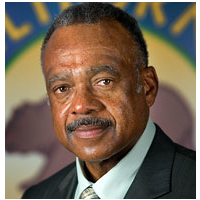Director of Embattled California Parks Department Quits after Just 18 Months
 Anthony L. Jackson
Anthony L. Jackson
Anthony L. Jackson wrapped up his brief tenure as director of the California’s Department of Parks and Recreation by abruptly announcing his resignation from the “challenging, but ultimately fulfilling” job.
It might have been a bit more fulfilling for the retired Marine Corps major general, who was hired 19 months ago to straighten out the scandal-wracked department, than Governor Jerry Brown, who appointed him.
Jackson was given the job in November 2012 with a mandate to reform the department. His predecessor, Ruth Coleman, resigned four months earlier after $54 million was found stashed in department accounts while 70 state parks faced closure because of budget cuts.
In the run-up to Coleman’s forced resignation, the state was preparing to close one-fourth of its state parks to save $22 million. But parks officials and supporters lobbied the Legislature, chased nonprofit money, begged already-hurting municipalities, added user fee revenues and cut deals with private interests.
By the end of June 2012, most every park was saved, at least for awhile. Within a month, the Sacramento Bee published a story that 56 department officials had claimed unauthorized buyouts worth at least $271,264 and said it stumbled on the hidden $54 million in the course of its investigation.
The money was sitting in the Parks and Recreation Fund ($20.3 million) and the Off Highway Vehicle Fund ($33.5 million), and may have been accumulating where even the state’s Department of Finance (DOF) couldn’t find it for more than a decade.
The department has been squeezed in recent years by a diminishing state commitment to fund its activities. Instead, parks officials have been pushed to strike public-private partnerships, amp up user fees, curtail available resources and focus on running the parks more like a business.
The Finance Department released an audit (pdf) shortly after Jackson was hired, verifying the unreported funds and blaming bad management and lousy training.
At the end of last March, Jon Christensen wrote in LA Observed about the progress Jackson was making at the “hidebound” agency. He noted the retired general’s belief that his military approach to management would work well at the quasi-military parks department and drag it into the 21st Century where millennial would be able to make sense of its antiquated ways.
A month later, Parks Forward, a blue-ribbon commission appointed by California Natural Resources Agency Secretary John Laird, released a report (pdf) that recommended a new non-profit organization be created to lead the reform movement while the department work on getting its own house in order.
The commission suggested finding new leadership from outside the normal parks and recreation pool of talent, creating a more nimble way of working with business and other stakeholders, and transforming the culture to one that respects innovation and leadership.
Parks Forward receives its funding from the S. D. Bechtel, Jr. Foundation, the William and Flora Hewlett Foundation, the James Irvine Foundation, the Marisla Foundation, the Gordon and Betty Moore Foundation, and the David and Lucile Packard Foundation.
Jackson will leave his post June 30.
–Ken Broder
To Learn More:
California State Parks Director Steps Down (by Don Thompson, Associated Press)
Anthony Jackson to Retire as California Parks Chief (by Christopher Cadelago, Sacramento Bee)
State Parks Director Quits as Overhaul Effort Continues (by Chris Megerian, Los Angeles Times)
Can a Marine General Transform California State Parks? (by Jon Christensen, LA Observed)
Director of the Department of Parks and Recreation: Who Is Anthony L. Jackson? (by Ken Broder, AllGov California)
- Top Stories
- Controversies
- Where is the Money Going?
- California and the Nation
- Appointments and Resignations
- Unusual News
- Latest News
- California Forbids U.S. Immigration Agents from Pretending to be Police
- California Lawmakers Urged to Strip “Self-Dealing” Tax Board of Its Duties
- Big Oil’s Grip on California
- Santa Cruz Police See Homeland Security Betrayal in Use of Gang Roundup as Cover for Immigration Raid
- Oil Companies Face Deadline to Stop Polluting California Groundwater





